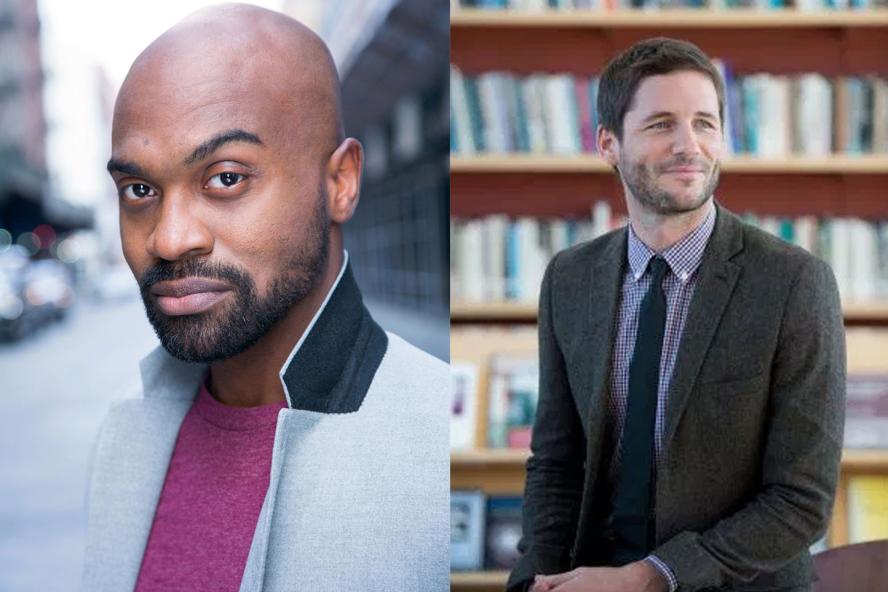Faculty Focus: Fall 2019

An accomplished group of new faculty takes to the Hill this fall. Below, get to know a pair of professors who are joining Tufts in Theatre, Dance, and Performance Studies, and Economics
Wearing Many Hats
When scanning Maurice Parent's lengthy acting résumé, the incredible diversity of his theatre roles stands out. The Donkey in SHREK the Musical, the anarchistic Tom Collins in Rent, the mischievous Puck in A Midsummer Night's Dream: Parent has played all these roles and countless others. Now Parent is preparing for his latest role, full-time professor of the practice in the Department of Theatre, Dance, and Performance Studies, where he had been a visiting artist from 2017 through last spring.
Parent, a native of the Washington, D.C., area, has performed off-Broadway and regionally, including extensively in Boston and Cambridge. For the past nine years, he has also been active as an educator. Besides leading master classes at the likes of the Lyric Stage Company of Boston and Actors' Shakespeare Project, he has taught at colleges and schools including Boston University, Northeastern University, and Milton Academy.
"Much of teaching is an extension of acting and of what happens in the rehearsal room, which I love," Parent says. "It's building a community and a safe space. Supportively challenging each other to delve more deeply into the work of making theatre and into ourselves as creative individuals and artists."
In addition to his theatre work, which also includes directing, Parent is now landing acting roles in commercials and TV and film projects. As a professor of the practice, he looks forward to sharing with his students what he learns through these new pursuits.
Parent is also co-founder and executive director of the Front Porch Arts Collective, a black theatre company whose mission is to advance racial equity in Boston through theatre. The group is aiming to build a home for shows that explore some element of black culture for diverse, inclusive audiences of all backgrounds. Another objective is to increase the diversity of the entire theatre ecosystem, from directors and designers to critics.
In the coming months, Parent will be directing Choir Boy at the SpeakEasy Stage Company and appearing in the Huntington Theatre Company's production of Sweat in January and February 2020. At Tufts, he'll be teaching "Introduction to Acting," which he also taught as a visiting artist.
A Perfect Fit
Eoin McGuirk grew up in Galway, Ireland, and earned his master's and Ph.D. degrees in economics at University College Dublin and Trinity College Dublin, respectively. His academic advisor at Trinity encouraged him to continue his career in the United States, which has a rich environment for academic economics.
After being named a Fulbright Scholar in 2011, McGuirk spent two years at the University of Berkeley's Department of Economics. He later completed postdoctoral work at the University of Gothenburg in Sweden, Brown University, and Yale University. Along the way, he chose to focus on development economics and political economy.
"Many people first get interested in economics from a development perspective," says McGuirk, an assistant professor in the Department of Economics. "The big-picture question is why some regions, countries, and families are so much richer than others. I felt economics was the discipline with the tools to help me rigorously think about questions like this."
Tufts is an ideal landing spot geographically for McGuirk, whose wife, Danielle Changala, is the general counsel of a solar development company in Boston. But the fit goes much deeper than that.
The Tufts Graduate School of Arts and Science's Ph.D. program in Economics and Public Policy, launched in 2017 as a joint degree with the Fletcher School of Law and Diplomacy, requires students to specialize in two of three fields: development economics, political economy, and environmental economics. Those areas of study, of course, are right in line with McGuirk's interests.
The economics department's focus on applied economics is another part of the appeal. McGuirk explains that over the past 20 years, economics as a discipline has developed more demanding standards for its data analysis. Powerful tools have emerged that allow economists to determine the causes of social, political, and economic trends rather than relying on potentially spurious inferences from simple correlations.
"Tufts has a lot of excellent applied microeconomists who are using those tools of causal inference to address policy-relevant issues in their own fields, be that development, political economy, labor economics, or the economics of education," McGuirk says. "The economics department is riding that wave, and it's a brilliant place to be from that technical perspective."
This fall, McGuirk will teach "Basic Econometrics," a course that looks at the tools that economists leverage to work with data and tease out causal relationships.
"There are so many articles out there that conflate correlation with causation," McGuirk says. "With this course, I'll have the opportunity to encourage students to think critically about these issues and give them the tools they need to both produce and consume more rigorous empirical work. It's a great honor and something I'm really excited about."